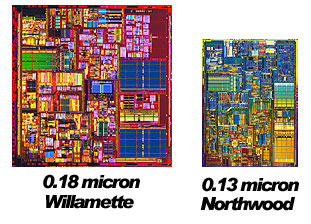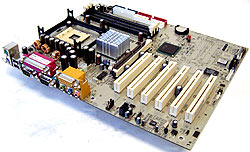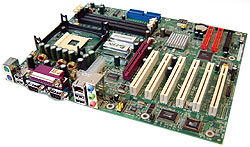|
Anticipating Nvidia's NV30 GPU
Hello,
By Monday morning, Comdex will have begun and we will be in one of
more than a dozen meetings with the industries best and
brightest manufacturers. As the show unfolds, we'll be trying our best to
get regular news updates back to PCstats.com, so remember to check the News section throughout the
day!
Since so many of you wrote in about the "How to Cut
CAT5" article, this week I've included a little guide to installing
CAT5 in a house..... with a 16" masonry bit. :) Not to be
forgotten is our review of the short lived Intel Pentium 4 2.66GHz processor
which was unceremoniously dropped, and killed, right after this review was completed. Just goes to show
you, even the experts can do silly things sometimes.
Moving onto a silver motherboard, we have the latest entry from Albatron
that has proved itself quite well in the benchmarks. Albatron's latest
i845PE board also made it
into this weeks newsletter, as did the 4SDA5+ from Epox, who sadly, won't be showing off
any of their cool boards at Comdex this year.
Last but certainly not least is Colin's latest
installment of the Fastest Webmaster series. Until next week, be sure to
try out the new search box on PCstats.com, and let me know what you think
of this stereo-style case - is this the way of the
future?
 For those of us who want top
of the line performance but don't want to spend a fortune, the Pentium 4
2.66 GHz processor offers a good mix of power and value. With a
street price of $650 CDN ($300 US) the P4 2.66 is certainly more
expensive than a comparable AMD Athlon XP, but it's still quite a bit less
then the $830 CDN ($410 US) a P4 2.8 GHz commands. I For those of us who want top
of the line performance but don't want to spend a fortune, the Pentium 4
2.66 GHz processor offers a good mix of power and value. With a
street price of $650 CDN ($300 US) the P4 2.66 is certainly more
expensive than a comparable AMD Athlon XP, but it's still quite a bit less
then the $830 CDN ($410 US) a P4 2.8 GHz commands. I
highly doubt you'll notice the 140 MHz
speed difference, but the $180 price difference
will be
immediately evident! The 2.66 GHz processor has all the technical goodies we
expect from a Pentium 4 processor including NetBurst Architecture, SSE2 and
Advanced Transfer Cache. It does not
support Hyper-Threading however, that speciality is reserved for 3.06GHz,
and faster Pentium 4's. The Northwood core has a great reputation for its
overclockability, even going so far as to pull back many enthusiasts from
the loving clutches of AMD.
Read the
Rest...
 With the
motherboard markets so competitive right now, manufacturers must take
extra measures to ensure their products stand out, and that you the
consumer buy them. This
competitiveness usually translates into more features for the consumer, and flashier appearances in
some cases. A few years ago,
the colour of a motherboard was determined by how it was made, usually
ending up green or brown in colour. A few manufacturers broke the mold and
tried
black PCB's,
which were originally marketed as Mil Spec grade if I remember correctly.
Albatron have chosen a nice shade of blue for
most of their motherboards, but the PX845E is obviously different... it's
coated in silver. According to Albatron, the coating on this motherboard is actual
silver. Not silver colour, but the actual metal suspended in a binding
agent. The apparent benefits of this are thermal dissipation for
board mounted components, and increased EMI shielding. Albatron claim that
in their own testing, on average a board with this silver coating produces
47% less EMI emissions than a non-coated
motherboard. With the
motherboard markets so competitive right now, manufacturers must take
extra measures to ensure their products stand out, and that you the
consumer buy them. This
competitiveness usually translates into more features for the consumer, and flashier appearances in
some cases. A few years ago,
the colour of a motherboard was determined by how it was made, usually
ending up green or brown in colour. A few manufacturers broke the mold and
tried
black PCB's,
which were originally marketed as Mil Spec grade if I remember correctly.
Albatron have chosen a nice shade of blue for
most of their motherboards, but the PX845E is obviously different... it's
coated in silver. According to Albatron, the coating on this motherboard is actual
silver. Not silver colour, but the actual metal suspended in a binding
agent. The apparent benefits of this are thermal dissipation for
board mounted components, and increased EMI shielding. Albatron claim that
in their own testing, on average a board with this silver coating produces
47% less EMI emissions than a non-coated
motherboard.
 I've been a big fan of Epox motherboards for
a long time now, and when I heard that they were producing a SiS 648 based
motherboard, I was very
interested to see how it would really perform. The SiS 648 chipset is
generally know as a good performer in most situations, sometimes even
rivalling Intel's DDR chipsets. Unfortunately, most of the SiS boards we
have tested have proven to be rather poor overclockers.
If any manufacturer can make a good
overclocking SiS 648 based motherboard, it's Epox. Right?In addition to the old standard IDE
RAID we find 5.1 audio (software codec), 10/100 NIC, IEEE 1394, USB 2.0, three DIMM slots which
support up to 3GB of PC1600/2100/2700/3200* (* - unofficial PC3200 support), 8x
AGP and six PCI slots. As you probably noticed, Epox put a
passive heatsink on the SiS 963
heatsink. At first I thought this was a cosmetic move, but during testing
the heatsink did get quite toasty! Either way it's great for piece of
mind.
Read the
Rest...
 PCstats.com's
3DMark2001SE Tweak Guide - Part 2 was very popular with
ATI users, but I received a lot of e-mail from nVIDIA gamers on how to
tweak their videocards as well. I guess I can't/shouldn't really neglect
them since about 60% of the videocards out there use nVIDIA GPU's. The 3DMark
benchmarks from MadOnion are quite popular and are often used to test
the power of computers, and while 3DMark may not always represent real
world 3D performance, it is usually a good indicator. As
we said in the original 3DMark2001 Tweak Guide, the best feature of the 3DMark
benchmarks is the ability to upload your score to the web and compare
your computer to some of the fastest rigs in the world.
The boys over at MadOnion setup "The Fastest Webmaster " contest, it's a friendly
competition between the hardware sites to see who can get
the highest scores. While I'm not first anymore, I'm still doing very
well considering my hardware... On a side note, I'm simply amazed at how
high the scores have come in the last year. I remember how difficult it
was to break the first 10k barrier! PCstats.com's
3DMark2001SE Tweak Guide - Part 2 was very popular with
ATI users, but I received a lot of e-mail from nVIDIA gamers on how to
tweak their videocards as well. I guess I can't/shouldn't really neglect
them since about 60% of the videocards out there use nVIDIA GPU's. The 3DMark
benchmarks from MadOnion are quite popular and are often used to test
the power of computers, and while 3DMark may not always represent real
world 3D performance, it is usually a good indicator. As
we said in the original 3DMark2001 Tweak Guide, the best feature of the 3DMark
benchmarks is the ability to upload your score to the web and compare
your computer to some of the fastest rigs in the world.
The boys over at MadOnion setup "The Fastest Webmaster " contest, it's a friendly
competition between the hardware sites to see who can get
the highest scores. While I'm not first anymore, I'm still doing very
well considering my hardware... On a side note, I'm simply amazed at how
high the scores have come in the last year. I remember how difficult it
was to break the first 10k barrier!
| Albatron PX845PEV Pro Pentium 4
Motherboard Review |
|
Installing a Home
Ethernet |
|
Albatron have in just a
short time, made their mark among enthusiasts and overclockers for
producing high quality computer components. In this article we will
be reviewing the relatively new Albatron PX845PEV Pro i845PE based
motherboard. The
Intel i845PE chipset officially brings DDR333 support to the
table, and if you are lucky enough to be able to afford a new
3.06GHz processor, Hyper-threading support.
A 10/100 Ethernet connection makes the
need to buy a NIC card a thing of the past, though the placement
right next to the PS/2 ports may be a bit troublesome. The Ethernet
connection is powered by a 3Com
910-A01 10/100 integrated NIC.
Albatron's earlier PX845E Pro was a good overclocker, and we were hoping
that the PX845PEV Pro follow in its tracks as well. We began to increase
the FSB slowly; starting first with 150 MHz FSB which proved quite stable...
Read
the
Rest...
|
|
There are
a growing number of homes these days which have met the demand for
multiple computers under one roof. A home-based Ethernet can quickly show itself to be
one of the most convenient ways to move data around.Ethernet's used to be the domain of businesses only,
but have gradually moved their way into the range of the average
consumer, and are now not uncommon. The
cost of setting up an Ethernet
is fairly reasonable when it is compared with the
alternative - installing a new media drive in two separate
computers.
For this article we are only going be focusing on
physically installing the network of cables necessary for a
hub-based Ethernet. This point hasn't been dealt with as much as the
configuration side of things. That said, installing
wire in a house imparts special precautions and attention to the
surroundings.
|
| Colin's Weekly Tech Tips |
| Written By: Colin "Yoda" Sun |
 |
Shortcuts for Everyone!!
One of the best yet 'hidden' features of Win2k/XP are the "Shortcut keys". From Winamp to Microsoft Word, you can open the programs you need now, with a few clicks of the keyboard.
What I like to do is right click on the shortcut icon in the Start Menu. Inside the box which will drop down you will find a "Shortcut key:" box. To use the Shortcut keys, simply press any character key on your keyboard and you'll see "CTRL + ALT" pop up next to that character. Press the "OK" button and then press that Shortcut key combination at the same time and the programs will now load! I haven't used Win9x/ME in a long time, so I'm not sure if this is 100% compatible with those two operating systems. |
| Colin's Tips Archives | The PCStats.com Forums |
The Last Word: Around here we munch on
Pengiun Caffeinated Peppermints; they're incredibly addictive, better
than coffee (sometimes), and oh so good - in moderation that is. :-)
|
 |
PCstats
Issue No.64
Circulation 165,000
The High Tech Low
Down
With Chris
Angelini |
|
One of the industry’s largest trade shows,
Comdex, begins early next week. Of course, most of the major players
will be there, demonstrating their latest products. Others will be
talking about hardware for the first time. Already,
NVIDIA has disclosed that NV30 will consist of 125
million transistors and execute 51 million floating-point operations
per second. More than likely, it will discuss NV30’s memory
architecture at Comdex, rumored to utilize 1GHz DDR-II modules.
There is also talk of a DirectX 8, AGP 8x-compliant, mobile
processor designed to rival ATI’s RADEON Mobility 9000. Then again, ATI may also have another trick up its sleeve… In other news, Athlon XP 2700+ processors
are finally available in limited quantities, from online retailers.
The 2800+ variant is still nowhere to be found, though, as
AMD expects availability early next year.
Intel isn’t waiting around for the flagship Athlon
XP to hit shelves. Rather, its 3GHz, Hyper Threading-enabled Pentium
4 is slated to debut this week. Remember that Hyper Threading
processors require platform and operating system support –
Intel has already confirmed its i850E, i845(P)E,
and i845G(E) chipsets will support the feature. VIA
and SiS have kept quiet, but my preliminary tests
with VIA’s P4X400 board confirm the feature is supported. You read it here first!
|
|
Next Week |
|
HT
supporting Motherbaords, Plasma Telvisions, and Comdex 2002...

|
Got a product you think PCStats.com shouldReview?
Advertising Enquiries |
